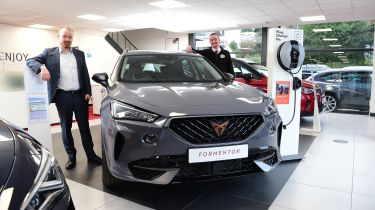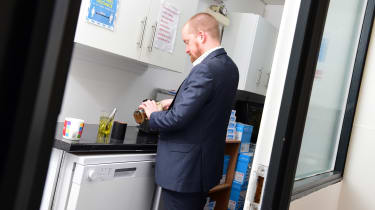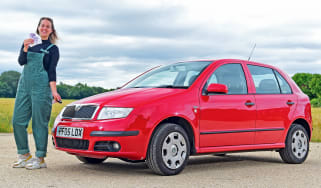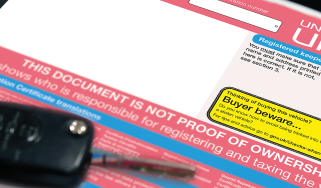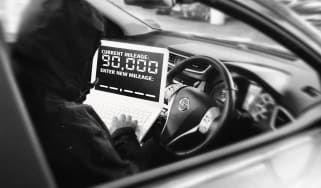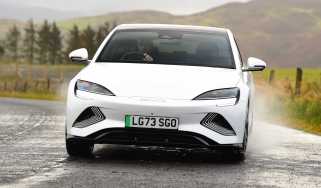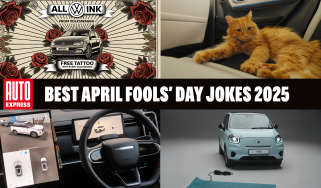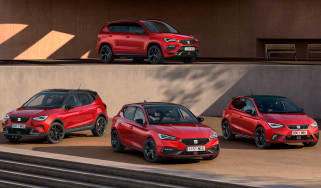Car dealer for the day: inside car sales and aftersales at a franchised showroom
We play the part of car dealer and find out how dealerships have coped with Covid, the semiconductor shortage and new ways of doing business
There's almost certainly never been a more unusual time to sell a car. Global chip shortages have meant that many new cars are on back order, while the knock-on effect of the increased demand in used cars means that it’s tricky to get the right stock. And then there’s Covid, which has forced the car-sales business, like many other industries, into a digital age more rapidly than anyone really expected. So who would envy a car dealer right now?
We wanted to approach the industry from the other side of the desk, to discover the kind of star qualities that are needed to be a great new-car sales exec in 2022. Not only that, but we also wanted to see how challenges to the industry – both from the pandemic, and in the face of fresh competition from online-only retailers – have encouraged changes and improvements to the traditional business model. And perhaps most importantly of all: can newbies like us manage to knock up that all-important decent cup of tea?
One Monday last month, we visited SMC Motor Group to find out. Its three main sites cover Hampshire and Surrey, with brands including Renault and Dacia, but we went to its Woking site, a SEAT and Cupra franchise.
SEAT’s 101-strong UK dealer network is the ideal place for us to pick up tips. In our 2021 Driver Power satisfaction survey, the group was rated an impressive fifth out of the 21 manufacturers covered, while its
sales team was ranked second overall; only those selling Porsches were rated more highly by readers.
SMC is fairly small compared with some of the big franchised networks. There are just three sales executives on this site, led by SEAT/Cupra brand manager Martin Lang. “I ended up here buying a car,” he tells us, “and next thing you know, I was training as a sales exec. 18 years later, I’m still here!” With all his experience in the business, Martin is the ideal person to talk us through the basics – like how does the typical Monday morning start?
The first order of the day is admin. The weekend is the busiest time for the trade, so the team will have spoken to a lot of customers. Some will have tested a car, some will have gone away to mull over the figures, others might not have committed to anything yet, and it’s useful to establish whether they’re serious. So the day starts following up leads. In the past, much of this will have been done on the phone, but the less confrontational approach – E-mail – has become a key point of contact.
Whether the customer is visiting for the first time, or is one of these leads who has come back, one vital skill proves to be qualification. “The first thing we need to know is, ‘will this car fit in with the customer’s life?’” says Martin. “That used to be easy when it comes to fuels. You’d ask the customer how many miles they drive a year; if it’s over 15,000 we’d suggest a diesel, under 10,000 they should go for a petrol.”
Mileage is still a factor, but with the growing popularity of plug-in hybrid and fully electric models, there are so many more questions to ask to make sure the customer is getting the right car. “Now we need to ask, ‘How long are most of your journeys? Do you have a driveway or a place to plug in at home or work?’ And people who used to travel 20,000 miles now work from home, so we need to check with the customer whether they’ve considered that their needs might be different from even a couple of years ago.”
And all of this needs to be done without leaving prospective buyers feeling like they’ve sat through an interrogation; plus, as SEAT sales controller Adam Medlock explains, too much jargon can be confusing if you’re uncertain about what you’re looking for.
“I like to talk to my customers at the car more than at my desk” he says. “It’s less formal, and I can show them the features of the car rather than just talk about them”.
Adam then guides talks us through the sales process, something which has become a little more fluid – even in the six years he’s been in the industry. “Previously there would be a lot of walk-ins, whereas now people are able to do their research online, and generally have a much better idea of what they want when they get to the dealership.”
One thing that the industry has found doesn’t work well is being a bit pushy – a method that Adam tries to avoid completely: “It’s important to go for a soft approach, which is something that in the past our industry hasn’t been the best at doing,” he says. That means giving the customer all the information they need and the time to process it. As with any method, it won’t guarantee a sale, but at the same time it won’t completely put people off, either.
Another part of the job that has grown recently is keeping in touch with those who have already placed an order and are sitting on a waiting list. The last couple of years have presented many hurdles – most recently the semiconductor shortage, which means buyers are waiting longer than ever for their cars. Calling those customers to update them with progress – or reassure them that they’re not forgotten – has become a prominent part of the buying process.
As with pretty much every industry, the Covid pandemic had a profound effect on the way the motor trade works. Initially, the approach was fairly routine. “We were literally chatting through the windows at customers to keep social distance!” says Martin. However, more sophisticated steps, like introducing click and collect, home delivery and – due to the fact that no test drives were allowed – 14-day return policies, were all implemented rapidly. “The industry was already moving towards digitalisation,” Martin continues. “We were testing the water with these methods. But then we had to just jump in with both feet.”
In the end though, Martin and his team believe that the changes have been positive. “It’s a lasting good that has come out of this,” he tells us. “The change has brought what would’ve been six or seven years of development in the industry down to just two.”
It helped to cope with the online rivals, too. “If someone wants to move quickly, we can do that, and do things with the minimum of interaction. But at the same time, if customers need to find out more or get in touch with us
in person then we can still do that.” That key difference is something that the web-only retailers can’t easily offer.
So we’ve been around for a day, and been shown the ropes. What hope is there of us becoming a salesperson?
Martin reckons two fundamental skills are needed: “First, how quickly can you understand the customer?
How soon can you understand their needs? The second is understanding the product. If you can do one, but not the other, then it’s no use. We are lucky with the brands that we have, because they’re a really good product. SEAT is great and Cupra is a really exciting place to be.”
It’s clear, then, that having a great product to sell and having a passion for the brand are key strengths, but there’s a more fundamental personality trait to possess, too.
“Of all the sales executives I have worked with over the years,” Martin adds, “the only constant between them has been this: they can all handle rejection well. The best sales executives will sell to one in three customers on average, and the worst one in five, which means even the best will be told ‘no’ twice as much as being told ‘yes’.”
So above all else, resilience is needed; understanding that a slow day or week might be beyond the sales team’s control. Perhaps it’s why the industry has managed to adapt to changes over the last two years so quickly.
And what about the tea we made? Well, it seemed to be palatable, so there’s hope for us yet.
Check out everything you need to know about PCP (personal contract purchase) here...
Find a car with the experts

